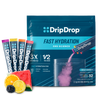Running is one of the simplest ways to burn calories and work on cardio, but just like any other activity, it has its own entry barriers that may cause potential runners to quit before they get started.
On the surface, it may be a simple, straightforward sport to participate in, but it requires the same amount of preparation as other physically strenuous activities, an investment in equipment, a dedication of time and the ability to stay motivated. However, once you’ve crossed those hurdles, running can be an extremely enriching way to enhance your life.
Benefits of Running for Beginners
You’ll Sleep Better at Night
According to a study published in Journal of Adolescent Health, making a morning run a consistent part of your routine could improve the quality of the sleep you’ll get at night.
Can Be a Stress Reliever
Can’t seem to find the time to get away and clear your head? Running can be a solitary activity that allows you to spend time with yourself, but that little bit of me time isn’t the only upside running can provide your mental health.
When you run, your heart rate increases. Research tells us that an increased heart rate can help undo the damage done to the brain when you undergo a stressful experience. Additionally, your pituitary gland releases endorphins when you run, which are hormones that cause you to take on a feel-good mood. You may have heard of a runner’s high. Endorphins are the cause of this euphoric feeling runners sometimes find themselves enjoying.
Can Safeguard and Improve Brain Performance
Consistent running sessions can help pump the breaks on mental decline due to aging. The aspects of our thinking processes that seem to benefit most are problem solving, switching from one task to another and quickly accessing working memory.
Can Protect You from Heart Disease
If you turn your curiosity about running into a running habit, you’ll have a better chance of avoiding one of America’s most dangerous killers. Those who run consistently are at 45% less risk of dying from cardiovascular diseases. Running at least 5 minutes a day nearly cuts the risk in half.
This is because running reduces blood pressure, makes you more aware of your blood sugar levels, increases the capacity of the lungs and improves good cholesterol (HDL) levels in the body.
Can Help with Weight Loss
Instead of trying a miracle pill or fad diet to lose weight, try running. Going for a run and pushing yourself hard can be tough, but it could also push your body to burn up to 800 calories per hour. You can’t get that level of calorie shedding from a stair climber or stationary bike.
When it comes to calories, the benefits running affords your body don’t stop once your workout stops. Running raises metabolism for some time after you finish your run, causing excess post oxygen consumption, or afterburn. This is the process your body goes through to repair itself and return to its pre-exercise state.
Can Be Good for Joints and Bones
When you run, ligaments around joints are worked in ways other exercise regimens can’t work them. This could assist in the fight against joint pain. Running also means more oxygenated blood is reaching joints and more toxins are being removed via sweat.
Starting Your Beginner Running Routine
Choose to run on a Surface Right for You
You can complete your running workout on a number of different surfaces, each designed to contribute its own strengths to the overall experiences. The presence of strengths implies the existence of weaknesses, so a beginner runner shouldn’t be surprised that each surface carries some downside with it, too.
Tartan is a springy synthetic surface used to create running tracks. This kind of surface can put unnatural stress on your Achilles tendon. Sand can do the sale to calf muscles, but sand forces you to lift your feet and provide training to those muscles that may otherwise be neglected during workouts.
Trails in parks and forests usually feature soft ground that provides cushioning for the foot’s repeated impacts, but they’re also covered in all sorts of natural hazards. Pavement can provide a smooth, open area for runners, but it doesn’t provide any cushioning.
Get the Right Tools for the Job
Unlike some sports or physically active hobbies that require a large investment in equipment to even try, running requires little gear. First, purchase a good pair of running shoes from an athletic wear or sporting goods store. Ask an employee to assist with your purchase and focus on your experience level. Try the shoes on and make sure they’re a comfortable option for the unique way your body moves forward.
While you’re there, you should also look into quality clothing. Running is repetitious and can create noticeable friction around different parts of your body.
Put Those Tools to Use
It’s time to get out there and make that investment in expensive shoes and gear pay off. For the first few sessions, practice interval running, hitting your body with short bursts of hard work to get it used to the feeling.
This kind of running plan turns a long run into a run walk combination with walk breaks every two minutes. Alternate between running and walking and add one minute each time you run. This sort of training plan should have you running a longer distance without the fatigue or hardship you’ll originally feel.
Budget Recovery Time
If completing that first run instilled you with a sense of accomplishment and made you eager for your next exercise excursion, then that’s a good thing! If you want to continue on your running schedule for beginners, though, you’re going to need to allow yourself some time to rest.
As a beginner runner, you should take a full day off before your next workout. Your body needs to recognize your new routine and prepare the muscles, bones and cardiovascular system for this new beneficial activity. Affording yourself proper downtime will help reduce overuse injuries that occur when you push parts of your body past their points of recovery.
Running Tips for Beginners
Proper Running Form
At the start, focus on relaxing your body while running and maintaining good form. As a beginner runner, there’s a good chance you won’t possess proper running form, but each time you go for a jog, your body is gaining the ability to string the necessary series of movements together to give you proper running technique.
Prepare for Soreness
That may seem a little harsh, but without pain, how do you hope to find the eventual gain? This may be one of the most important tips for running beginners, but it isn’t an easy tip to take to heart.
Soreness is normal and may be something you always encounter after a workout. That’s why the aforementioned recovery time is so important. Also, don’t worry too much about side stitches. Some people experience them when they participate in physical activity.
Stay Motivated
Sometimes, we all need an extra push. Having goals like running a marathon for self-confidence, raising money for a charity or exercising to lose weight can help towards getting you into a routine, but that routine will be strengthened by habit. A running schedule for beginners can give you dates and times, but showing up to those appointments is another story.
Many repeating factors contribute to habitual running, including keeping a regularly scheduled time, seeing the same people, going to the same place—even listening to the same music. You can increase that motivation by affording yourself rewards for a run well done or forming a support system with people that’ll look forward to seeing you—and help keep you accountable if they don’t.
Preventing Running Injuries
We’ve already discussed the need to run relaxed, especially while your body builds up strength in the muscles that’ll help you keep proper running form. High quality gear that’s built for running will also help keep injuries at bay. However, two other options will help avoid injuries even after you’ve shed that beginner status.
See A Doctor Regularly
You should visit your doctor before beginning your running journey or before any other exercise regimen is started. Regular checkups can help affirm you’re still healthy enough to continue running and will help you keep track of your progress.
Cross Training
Other physical activities will nurture the joints, muscles and bones in your body and help you develop different strengths. For example, cycling can build leg strength while freeing you from the repetitive movements of running for a while. Skiing can improve cardio while adding to endurance. Swimming can provide a total-body workout.
Nutrition and Hydration for Running
Proper nutrition will help you give as much as possible to your running workout, which means you’ll reap as many benefits as possible.
No matter how much a body is made to run, hydration is an ever-important aspect of human functionality. Dehydration can mess with mood, make you feel faint or cause any number of issues that can impede your run. Proper hydration can help you unlock your full potential while exercising because it’ll keep joints lubricated, keep blood pressure low and keep muscles energized.
Maintain Optimal Hydration with DripDrop and save 25%
Water does so much to keep bodies performing well in workouts, but electrolytes can push a body into peak performance mode by doing what they do best: assisting the body with communication and nutrient distribution. Using DripDrop's precise formula will introduce three times the electrolytes into your system than a sports drink while only giving you a third of the sugar.
Additionally, for those looking for dehydration relief without the sugar, DripDrop offers DripDrop Zero, a zero sugar option.
If you have your favorite flavors picked out, subscribe and save 25%. If you want to try everything DripDrop has to offer before signing up for a subscription, get a fun selection of flavors with the multi-flavor pouch.
Running can be extremely beneficial for your mind and your body. Make sure you’re making the most of the time you spend exercising.












